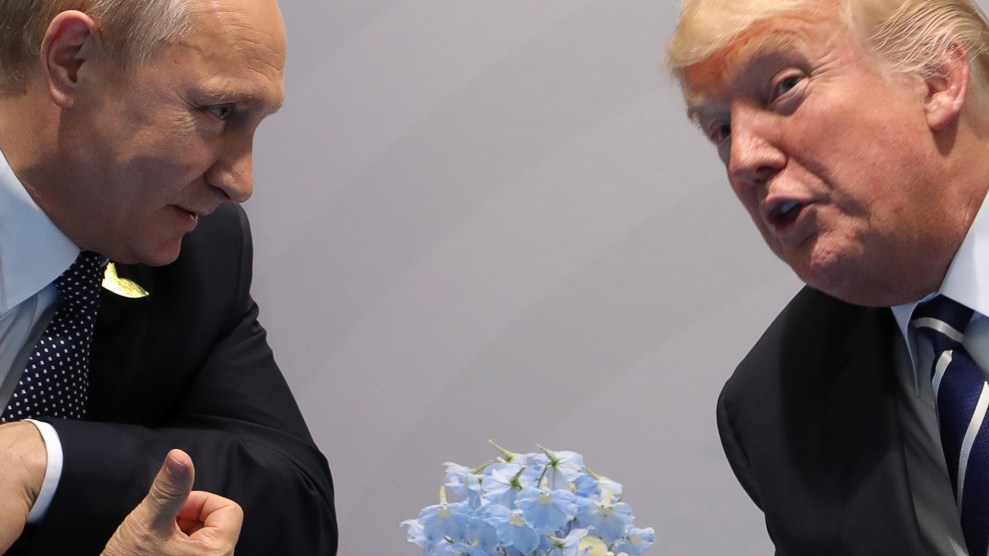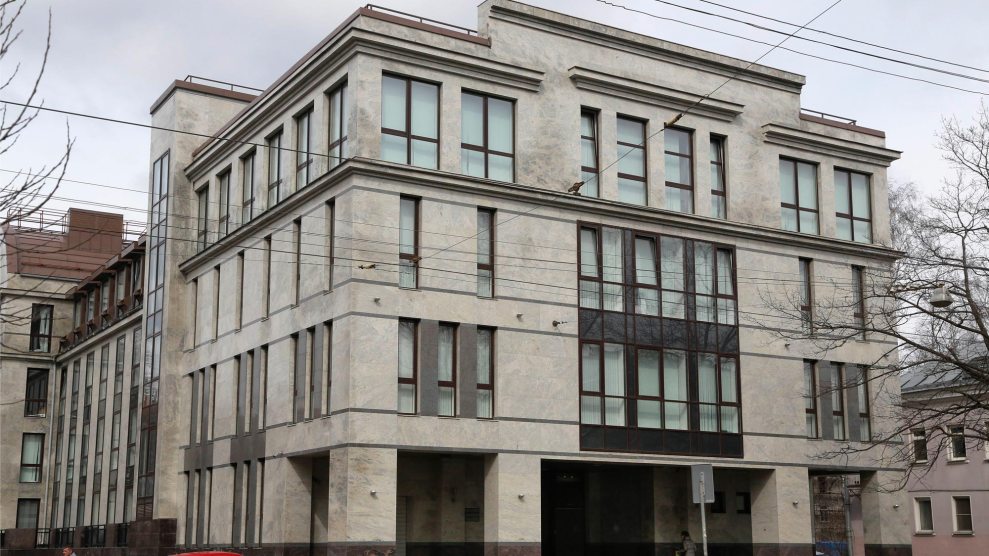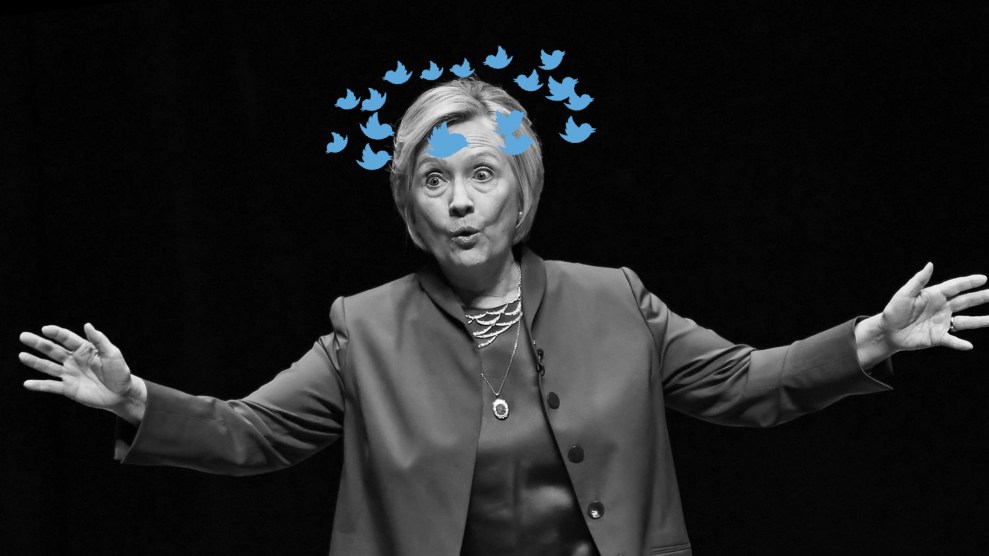
At the 2017 G20 Summit in GermanyKlimentyev Mikhail/ZUMA
The reporting begins in the 1980s with the experiences of four children and three adults—a philosopher, a psychologist and a sociologist—as perestroika was dawning and the Soviet Union was starting to open up under Mikhail Gorbachev. In The Future is History: How Totalitarianism Reclaimed Russia, journalist and author Masha Gessen weaves the journeys of these individuals over the next three-plus decades into a Russian novel-like tapestry. She shows a society moving toward democracy but then turning back toward what the sociologist calls “recurrent totalitarianism”—like a recurring infection—and embracing a strongman leader, Vladimir Putin.
Gessen emigrated with her family to the United States from Russia as a teen in the 1980s, and returned to Moscow in the ’90s, where she worked as a journalist for about 20 years until Putin’s crackdowns began to threaten her own young family. A finalist for the National Book Award, Gessen’s latest volume is deeply personal, illuminating recent history through the events of her subjects’ lives, including the chaos of the Moscow protests in 2012.
Also the author of a 2012 biography of Putin, The Man Without a Face, Gessen of late has been a frequent critic of the authoritarian tendencies of President Donald Trump. She spoke with Mother Jones about the similarities she sees between Trump and Putin, and the rising danger to American democracy. She also talked about how the media is faring in the face of Trump’s nonstop lies—and how to really think about the ongoing investigations into the Kremlin’s attack on the 2016 election.
(Note: This interview was lightly edited for length and clarity.)
Mother Jones: You have written that in this book you wanted to tell “the story of freedom that was not embraced, and democracy that was not desired.” Do you think Americans are cavalier about our own democracy?
Masha Gessen: I think we’ve certainly held to this American exceptionalism. There’s been this idea that it can’t happen here. What I think has happened since the election is that for about 30 seconds, people were, like, “Oh, maybe we are part of a worldwide trend of turning away from democracy.” But then it immediately turned into: “What’s happening in the United States is the most horrible thing of any horrible thing that ever happened anywhere!”–which is also not true. I don’t think we are cavalier any more. I think some people have blind faith in American institutions without knowing a whole lot about them and think they will stand up to Trump and are indestructible. I actually think democracy is not a definable and achievable state. Any country is either becoming more democratic or less democratic. I think the United States hasn’t tended to its journey toward democracy in a long time. It’s been becoming less democratic, and right now it’s in danger of becoming drastically less democratic.
MJ: In your book you are looking at a society that was becoming more democratic and then slips back into totalitarianism. Part of that was the fact that people embraced a strongman personality. Why do you think that’s appealing?
MG: I didn’t think this when I was writing the book, but it weirdly has a lot of implications for this country as well. I quote a lot of Erich Fromm in the book because I think he is the best writer on the psychological state of wanting to give up freedom, and his book Escape From Freedom is about that. His theory is that there are certain times in the history of humanity when people feel so unmoored that, for most people, freedom becomes unbearable. They are offered too much freedom all at once. He divides freedom into “freedom from” and “freedom to.” And “freedom from” is what everybody wants. Everybody wants to be free from their parents telling them what to do. But “freedom to” is freedom to invent oneself, to create a future. And that creates a great amount of uncertainty that for some people is just unbearable. That’s when we get Calvinism, or Hitler, or Stalin, or Lenin, or Putin. And I also think that’s when we get Trump.
For Russians in the ‘90s, there was that sense of not knowing what the future held at all. And coming off a long period of when people actually were robbed of the ability to plan their future–that’s very much a part of totalitarian control–that exacerbated it. In this country, we are not coming off a long period [like that]. But I think that for a lot of Americans, as a result of globalization, as a result of the housing crisis, the future is just too uncertain. And their place in the world is too uncertain.
MJ: Are there lessons we should take away from the Russians’ experience?
MG: There’s not a whole lot of similarity between the two societies. There are similarities behind psychological forces. One thing we can learn is that things can change pretty fast. And this idea that we know who we are and that things can only get so bad in this country—that’s wrong.
MJ: In the book, you talk about the hijacking of language. The sociologist is writing a survey to ask people’s opinions, and one of the challenges was that key words had been co-opted by the government. Is this a continuing issue in Russia?
MG: It’s very much an ongoing phenomenon. It was very much the case in the Soviet Union. Words were used to mean their opposites. Freedom meant unfreedom and elections weren’t elections. But also, when the state has a monopoly on media, which is the case in Russia, then it owns the conversation. In that particular case, there were no words that could be used to gauge people’s opinions toward LGBT people because there was no neutral term to which they could express an attitude. It’s a pervasive problem because the state owns the conversation.
MJ: Do you see any signs that this is becoming an issue in the U.S.?
MG: Here, we are not in danger of the White House owning the conversation. Far from it. But we do have a problem with a president who uses language in two distinctly destructive ways. One is to lie, and to use words to mean their opposite. Like, when he calls the Russian investigation a “witch hunt.” He can’t call it a “witch hunt” because a witch hunt is something that a powerful person does against a powerless person. The most powerful man in the world cannot be the object of a witch hunt.
The other thing is, he just talks nonsense. He creates word salads. And that is awful to language, especially because we try to parse out what he’s saying and try to find meaning in it. Part of the problem is that journalists don’t have a choice about reporting what the president says. I find the idea – “Let’s not write about his tweets” – to be absolutely ridiculous. I mean, he’s the president! Of course, we have to write about his tweets. Of course, we have to look at what they mean. The problem is, they’re hollow. So, every time you interpret what he’s saying, you normalize it. But you don’t have the option of ignoring what he’s saying because he’s president. That’s damaging to language, and that’s damaging to journalism.
MJ: Regarding Trump’s lies: Last year, there was a study from the RAND Corp looking at Russian propaganda strategies, and they called it “The Firehose of Falsehood.” That title immediately brought to mind Trump and his onslaught of lies. Do you think there’s a strategy here?
MG: If you mean, does Trump have an actual concept of what he’s doing? Then, no. He clearly doesn’t have the intellectual capacity to have a concept of what he’s doing. I think he has a very strong instinct for using lying to assert power, and that’s what he does. Every time he lies, especially when he lies about something really obvious – like the size of the Inauguration – he’s saying “I can say whatever I want, whenever I want to, and there’s nothing you can do about it.” I think he understands that instinctively. He has a finely honed sense for power and manipulation. Bullying is another way to put it. He’s a highly skilled bully, but bullying is not a very sophisticated strategy.
MJ: Is this a way that Trump and Putin are similar, or different?
MG: They’re quite similar that way. The cacophonies they create are very different in flavor. But they are absolutely the same in the way they use lying to assert power.
MJ: Since we have to report on what Trump says: Have you seen an effective way to report on lying?
MG: Fact-checking is a terrible way to report on lying. It’s like we enter into a dialogue with him. It’s as though, he says “A,” and we check “A,” and it gives it no context. Saying that he’s “misstating” is an even worse way of covering it. That’s NPR’s ridiculous policy of not calling his lies “lies.” It’s really destructive.
There’s this American pretense, and this is a very American phenomenon, which is the pretense of the journalist with the view from nowhere – which has somehow morphed into the journalist who was born this morning. So, he doesn’t know that Trump lied yesterday, and the day before and the day before. Therefore, he concludes that he doesn’t know whether Trump lied accidentally or on purpose. But you can only pretend not to know that if you don’t know that he lied yesterday, and the day before and the day before. So, to my mind when NPR says they don’t know if he’s intentionally lying, they’re lying.
We have to be smarter about it. Look at the tactic. Look at the way he’s doing it. Describe it as it is and don’t pretend to not understand it.
MJ: In your New York Review of Books essay right after the election, “Autocracy: Rules for Survival,” you ended on a positive note, reminding Americans that Trump is temporary and to stay focused on the future. But at the end of your new book, you strike a very different tone. Is there hope for democracy in Russia?
MG: I don’t think so. But that’s the difference between here and there. I could say the same about Russia in the sense that Putin is not forever, so we have to think about what happens after. It’s just that I’m pretty pessimistic about what happens after. With Trump, I think there’s a lot more reason to have hope, but we really have to think about what happens after, and not just about what can be used to topple him now. I just wrote a piece for The New Yorker about this book by psychologists and mental health professionals on diagnosing Trump. That’s a terrible idea. If we were never going to have another presidency in this country, this would all be fine. But the idea that a sort of policing organ for the sanity of the president should be created is terrifying to me. There will be an after-Trump. Do we want to enter it with the idea that there are psychiatrists who evaluate whether the president is sane? That’s a really scary mechanism to have.
MJ: Your book isn’t about “Russia-gate,” but when people ask the inevitable question, what is your perspective on the investigation into Russian interference into the 2016 election?
MG: I think the investigation should go on. I don’t think the investigation will come up with conclusive evidence of collusion. I think it will come up with a mess, a lot of unsavory contacts and loose ends. What worries me about the investigation is that I think people have put all their hopes in it. They hope that somehow when the investigation is over, our national nightmare will be over – which is silly. Even if the investigation came up with conclusive evidence of collusion, there’s not a path from there to impeachment. Not with the House and Senate Republicans. But also what worries me is that it gets people into this mode of thinking about the hidden stuff that tends to be uncovered, rather than dealing with things that are actually happening out in the open that are terrifying and damaging. I would much rather engage people in a conversation about deregulation and reversals of women’s rights and civil rights and LGBT rights than conversations about Russian interference. Ultimately, it’s the stuff that’s happening out in the open that’s having a much more lasting effect.
MJ: Why do you think there’s a focus on the hidden stuff rather than the obvious?
MG: We want to blame the Russians. We want it to not be us. We want him to have come from outer space. And if not from outer space, then at least from Moscow. He was an American who was elected by Americans.
MJ: You also work on translation for the TV series The Americans. If there’s any truth within that fictional story of previous covert actions by Soviets in the US, should it be surprising that there would be Russian influence operations now?
MG: I have no doubt that there are Russian efforts to disturb the fabric of American democracy, but they’re disruption efforts. They’re troublemaking efforts. They’re also not illegal. The working theory behind the intelligence report on Russian interference is that Russia influenced American public opinion. We may not like that, but if it influenced American public opinion, at least in the guise of legitimate activity—which is what the report says—then there’s nothing you can do about that. Where it would be improper and illegal would be if there was actual collusion in those efforts. We don’t know that. Let Mueller do his job.

















